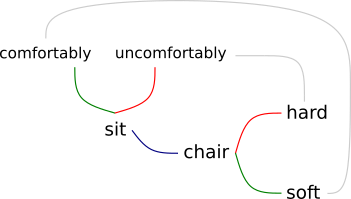Back • Return Home
Language Learning Tools: Word Webs & Complementary Pairs/Sets (06/29/2020)
Sometimes people become overwhelmed when confronted with a list of vocabulary words. Without a context, committing these words to memory may seem like a chore. However, there is an easy way to build up some context, especially if we have multiple lists of related vocabulary words.
First, let's find all of the "concrete nouns" (i.e.: words that represent actual physical objects that we can sense). We will start off with these words for two reasons:
• They are easy to visualize.
and
• Many common household objects that we encounter everyday fit within this category.
Each of these words will act like a "nucleus" around which all of the other words that we collect will be arranged in a web-like structure. For example, let's start with the word "chair".
Then, we will find some "adjectives" (i.e.: words that describe the properties of those nouns). To continue our example, a chair can be either "hard" (like a wooden chair) or "soft" (like a chair with a cushion).
Notice that adjectives often come in some kind of complementary pair, or a spectrum of words with related meanings.
Next, we will find some "verbs" (i.e.: words that describe actions or processes) that can be done with those nouns. We "sit" in a chair.
Try to focus in on verbs that can be done with the body in relation to that noun. This is also for two reasons:
• We don't want to introduce more nouns than we need to.
and
• We often talk about what people do, whether in reference to ourselves or others, so actions done with one's body are incredibly common verbs.
Finally, in some instances, we can also find some "adverbs" (i.e.: words that describe how verbs are done). To pick up our example one last time, we might sit "comfortably" on a soft chair or "uncomfortably" on a hard chair.
We will call this a "word web". Some word webs can be smaller, while others can be significantly larger. We could further expand on this example word web, but this size will suffice for now.
Notice that all of the words within the word web reinforce one another. This added context aids in memory. If we can recall at least one of the words, then it is more likely that we will be able to recall everything attached to it.
The stronger that we make these associations, the more easily the language becomes a reflex. With our "native" language, we don't usually think much about how to recall the meaning of individual words, but focus more on the overall meaning that we intend to convey through them. This is because these types of connections are already thoroughly conditioned into a habit after many years of unconscious exposure and use. This tool can be helpful in getting there more quickly within another language by using it to consciously build up these connections instead.
Happy Studies!
← Yesterday • Tomorrow →

